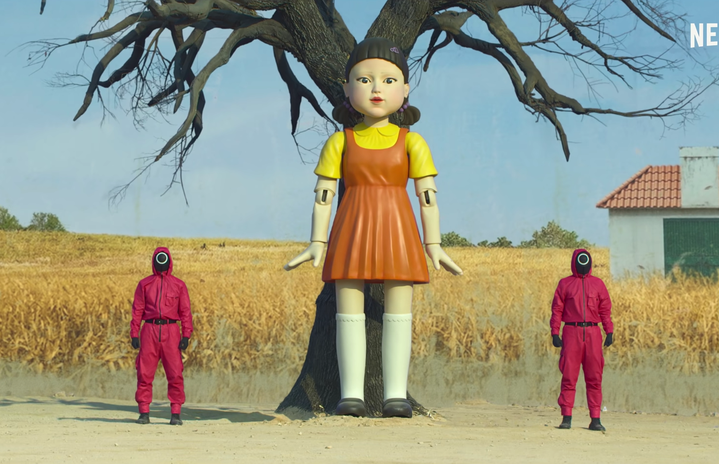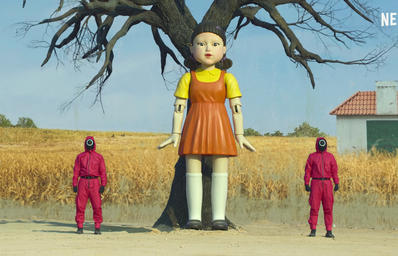In only a month, “Squid Game” surpassed 142 million views, knocking period drama “Bridgerton” from its throne as the most-watched show on Netflix. With its stunning practical effects, amazing writing, and talented cast, this South Korean drama has easily become an international sensation.
However—while the premise of the show is plenty riveting for audiences, its main message goes beyond the death games and the cash money prize at the end. In fact, writer-director Hwang Dong-hyuk has stated that “Squid Game” is an allegory about “modern capitalist society,” starring “characters we’ve all met in real life.”
With that being said, let’s look at how “Squid Game” critiques one of the world’s most dominant economic systems.
(Warning: spoilers ahead.)
ILLUSION OF CHOICE
Choice—or lack thereof—is a theme that is introduced as early as Episode 1, through Clause 3 of the Player Consent Form: if all the players agree to stop playing, the games are allowed to end.
Though this gives off the impression that players’ participation is voluntary, it’s later obvious that this is not actually the case. In Episode 2, after the true stakes of the games are revealed, the players vote to leave the island and return to their lives. However, they soon realize that they have nothing to return to but debt, poverty, and ironically—death.
Player 322 said it best: “In here, I stand a chance at least.”
The offer of withdrawal from the games is a sham. Every single player is in a position where leaving and forfeiting the prize money isn’t an option, effectively placing them between a rock and a hard place. Otherwise, why else would the Salesman only target those in abject poverty? The ddakji match is specifically designed to gauge whether or not the mark is desperate enough to participate in the games.
After all, if a person is willing to be degraded and injured for a hundred thousand won, what would they be willing to do for several billion?
MYTH OF EQUALITY
A big selling point of the games is the supposed equal opportunity they provide the players. As the Front Man puts it, “[These] people suffered from inequality and discrimination out in the world, and we’re giving them the last chance to fight fair and win.” He even asserts this conviction by executing two workers for providing a player with advanced knowledge of the games, giving him an unfair advantage over the others.
Still, despite what the Front Man may believe, the reality is that the circumstances are far from fair.
The Lights Out sequence is a blatant illustration of this. The workers stage a culling by providing the players with little food, provoking them into fighting and killing each other. The reason for this, they say, is to weed out the weak for the following game: tug-of-war.
Tug-of-war is a game that relies greatly on physical strength. While our heroes managed to survive with strategy (and main character armor) on their side, other teams were not so lucky. Players that were less strong than others dropped like flies during Lights Out, and those that lived long enough to form teams still ended up dead after being bodily hauled off the tug-of-war platform.
Though equality is advertised, the competitions are biased towards certain demographics. This leads to more subtle demonstrations of prejudice by and towards the players.
When the main characters are trying to form their team, one of the members, Cho Sang-woo, points out that they already have an old man and a woman, ordering the others to find more men. He also tells a group member, Ali Abdul, to hide his disfigured hand, so as not to seem weak.
This favoritism mirrors that of modern workplaces, where the elderly, the disabled, and women are faced with more difficulty, and “equal opportunities” turn out not to be so equal after all.
MORALITY IN SURVIVAL
If you’re anything like me, Episode 6 left you emotionally distraught and your tissue box with fewer tissues than it began with.
In this episode, our cast of heroes is tragically halved when they find themselves pitted against each other in what can basically be summed up as Marbles to the Death. The misleading and involuntary nature of the pairings denotes another theme: forced competition.
Not only are the games deadly, but they force the players to be responsible for the deaths of others. Escaping blame is impossible in the marbles game because a player’s victory is completely dependent on making their opponent lose, and how far a player is from the end can be measured by the number of bodies they climbed over to get there.
Characters are backed into corners, where they are required to make immoral decisions in order to survive. The most obvious example of this is Sang-woo and Ali—with Sang-woo resorting to betraying Ali and stealing his marbles, leaving him to die. On the grayer end of the spectrum, the main protagonist, Seong Gi-hun, uses his partner’s dementia to lie his way to safety, effectively sentencing an old man to death.
Summarized so plainly, their decisions probably seem evil; in context, their actions tie back to the illusion of choice.
Characters who are playing to survive don’t have the choice to be good. The games are designed in a way that those who take advantage and go behind the backs of others are rewarded, and those who do not are punished. Characters like Ali, who represent virtue and kindness, are killed off to convey that simply being generous and hardworking is not enough to succeed in a system that requires stomping on others to get to the top.
There most definitely exist some unsavory figures in “Squid Game.” However, the players, regardless of morality, are all depicted as victims of a larger antagonist: the games.
In case I haven’t made it clear enough, the structure of the games themselves represents the starkest criticism of capitalism: the idea that people must earn the basic right to live.
“Squid Game” demonstrates capitalism at its worst: a system that pits the poor against each other for the entertainment of the rich; that forces them to make bad choices for the survival of themselves and their loved ones; that maintains itself through unethical consumption on the backs of the struggling disadvantaged.
With its assessment of modern capitalism’s flaws mindfully threaded through an in-depth and compelling narrative, “Squid Game” absolutely deserves its acclaim.






